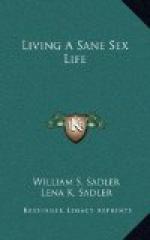It is a rare case in which, by mutual willingness, and desire and mutual effort to remove the obstruction, it cannot be eliminated with satisfaction to both bride and groom. If, however, careful and well-executed efforts fail to remove it, the services of a surgeon should be procured, and he, by a very simple and almost painless operation, can remove the difficulty. But never, no never, should it be brutally torn away by the force of the husband, and without the full willingness of the wife. Mark this well. As a matter of fact, the wise and practical thing for every bride to do, would be to go to a surgeon a few days before her wedding, and have him remove the hymen for her. Such operation is nearly painless, and is very easily done. Still, to do this might raise a doubt of virginity on the part of the husband and so this is a point to be careful about!
The act of removing the hymen is often spoken of as “defloration”—the tearing to pieces of a flower. The term is not fortunate. Nothing worth while has been taken away by removing the hymen, but much that is useful has been acquired. An organ that has outlived whatever usefulness it might once have had has been removed, and its going has made possible new and beautiful uses in life. If this has been accomplished by the mutual desire and effort of the bride and groom, it is a cause for joy and not of sorrow; of delight and not of mourning. As well weep over the removal of the vermiform appendix as for the destruction of the hymen.
With this obstacle rightly overcome, the second act of coitus offers no situation that calls for further remark or explanation.
And now a few words about the probabilities of conception resulting from coitus, and some matters which are very closely related thereto.
In the first place, every healthy and fairly-well-provided-for husband and wife should desire to have children, and should act in accordance with such wish. This is not only in harmony with the primary purpose of sex in the human family, but it is a response to a natural demand of the human soul, in both man and woman. As Bernard Shaw makes Jack Tanner say: “There is a father-heart as well as a mother-heart” and parenthood is the supreme desire of all normal and wholesome-minded men and women. It is not an “instinct,” but something far above that quality.
Parenthood among mere animals is the result of instinct, and of that alone, but not so in the human race. Human beings naturally desire to make a home for themselves, and a home, in the fullest meaning of that word, means children and a “family circle.” This is something that animals know nothing about. Animal mothers forget and ignore their progeny as soon as they are weaned; and animal fathers will, in many cases, kill them as soon as they are born, if they get a chance to do so. These facts prove that parenthood, in the human family, is something much more than in the rest of the animal kingdom. Indeed, the whole matter of comparing this quality, as it exists in humanity, with that of animals merely, is only a continuance of the similar abomination of comparing the sex functions of these two forms of life. In the real essentials of existence, they are in no way comparable; and to make such is not only folly, but approaches the positively criminal. The results of doing so certainly lead to crime.




